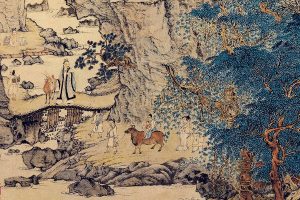抱朴子
卷三•地真
Master Of Embracing Simplicity
Chapter 3• Earth’s Truth
The following excerpt from Ge Hong’s《The Master of Embracing Simplicity》 [bao pu zi 抱朴子] chapter three has been translated as part of a preliminary research about the term Plain and Unadorned [pu su 朴素] [1], a concept at the core of the Daoists Lao Zi and Zhuang Zi:

‘我等不知今人长生之理,古人何独知之?‘‘此盖愚暗之局谈,非达者之用怀也。夫占天文之玄道,步七政之盈缩,论凌犯於既往,审崇替於将来,仰望云物之徵祥,俯定卦兆之休咎,运三棋以定行军之兴亡,推九符而得祸福之分野,乘除一算,以究鬼神之情状,错综六情,而处无端之善否。其根元可考也,形理可求也,而庸才近器,犹不能开学之奥治,至於朴素,徒锐思於糟粕,不能穷测其精微也.
“We do not know the principles of long life for the people of today. How could only the people of ancient times know [of it]?” “This is because it is the talk of the stupid ones and the ones in the dark, [and] does not reach the ones who would use and cherish [it]. Observing the Mysterious Dao of the Heavenly Scripts and stepping on the Seven Regulators’ [1]Progressing and Retreating, [one ought to] consider [their] insult and offence to the past and know the sublime to replace [it] in the future. [One should] look upwards to the clouds’ objects for auspicious evidence and looking downwards to fix the trigrams’ omen of good or bad fortune.
[One ought to] move three chess pieces in order to fix the rise and decay of the employment of the troops. By pushing the Nine Talismans [one will] obtain the boundary [of the realms] of fortune and misfortune. By the multiplication or division of one calculation [one is able to] carefully study the condition of the Corporeal Soul and Spirit, and the intricate and complex Six Emotions [3] . Yet [one] dwells and is situated in the limitless goodness and evilness. Its root origin may be examined [and] the principle of form may be sought, yet mediocre people and [people] close to talents are still unable to commence [their] studies of the mysterious governance. Going so far as [in regards to the] plain and unadorned, the disciple sharply ponders on the useless dregs, [but] is unable to thoroughly survey [its] essence and subtleness.”
[1] Lau explains that Pu [朴] in the《Dao De Jing》 primarily means “the uncarved block is in a state as yet untouched by the artificial interference of human ingenuity and so is a symbol for the original state of man before desire is produced in him by artificial means”. [wikivisually.com/wiki/Pu_(Daoism)]
[2] The Six Regulators are the sun, the moon and the Five Planets.
[3] According to the 《Communion with the White Tiger》 [bai hu tong 白虎通] chapter on the Inner Nature of Emotions [qing xing情性] , the six emotions are happiness, anger, sorrow, joy, love and hatred, [xi nu ai le ai wu喜怒哀乐爱恶].
